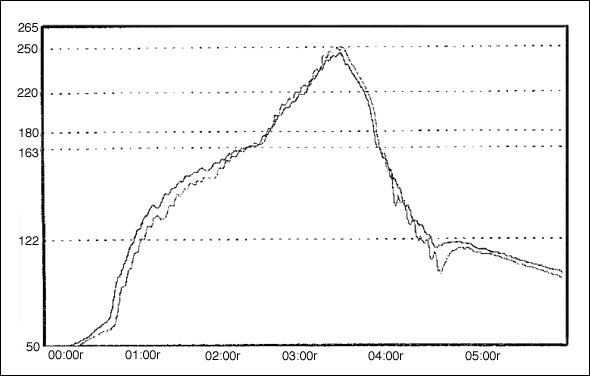Assembling High-Lead (Pb) DS2502 Flip-Chips in a Pb-Free Assembly Flow
Abstract
Usage of lead (Pb) in electrical and electronic components has recently been prohibited by the European Union through the Restriction of Hazardous Substances Directive (RoHS). Because of these regulations, assembly processes must become lead-free (Pb-free). Although the DS2502 flip-chip die are exempt from the RoHS regulations, they have been successfully assembled in a Pb-free reflow process. This application note details the Pb-free assembly process used, and the reliability stresses encountered after the assembly.The test data show that the DS2502 flip-chip die are acceptable for use in a Pb free reflow assembly process using the parameters listed in this document.
Introduction
Recent regulations from the European Union limit the usage of lead (Pb) in electrical and electronic components. These regulations are formally referred to as Directive 2002/95/EC, but commonly referred to as the Restriction of Hazardous Substances Directive (RoHS). Included with the RoHS is an annex (page 5) that lists all the exemptions to the directive. Item 7 of the annex states: "Lead in high melting temperature type solders (i.e., Tin-lead solder alloys containing more than 85% lead)." In accordance with the Item 7 exemption, Maxim's bump technology, commonly known as "flip chip," is RoHS exempt due to its high melting point, 95% lead (Pb), solder bump construction. A copy of the hazardous content for the DS2502 is included in Appendix A.
Environmental Impact of Lead
In the United States, approximately 10,900 tons of lead were used for electronics soldering in 1998. That lead eventually enters landfills with other electronic waste. More than 4.6 million tons of electronic waste ended up in
To comply with the RoHS directive, many manufacturing facilities have moved to a Pb-free assembly process. That assembly process ensures that less lead ends up in landfills, and ultimately promotes a cleaner environment.
Due to the RoHS directive, many assembly processes must be performed using Pb-free solder in a Pb-free reflow process. Although the flip-chip die are exempt from the RoHS directive, Maxim assembled more than 396 flip chips using a 250°C peak reflow temperature assembly process. After the assembly, the flip chips were subject to industry-standard reliability stresses. The DS2502 flip-chip die had zero critical failures and successfully passed reliability stresses. This document describes the reflow process used and the reliability stresses involved.
Pb-Free, Board Assembly Reflow Process
The DS2502 flip-chip boards were assembled using high-temp, FR4 PC board material with a Tg > 170°C. The CAD drawing for this board is included in Appendix B. The flip chips were attached to the board using Indium5.1 Pb-free solder paste from Indium Corporation of America® (refer to the Indium5.1LS product data sheet). The DS2502 boards were sent through a 5-zone BTU model SSA 70 reflow oven for assembly. The conveyor in the oven was set to 25 inches per minute, and zones 1 to 5 were 185°C, 200°C, 215°C, 270°C, and 300°C, respectively. The peak reflow temperature was 250°C. The reflow profile is shown below in Figure 1, and also in Appendix C.

Figure 1. DS2502 reflow profile.
DS2502 Reliability Stresses
After the Pb-free assembly process, 396 assembled boards were subjected to industry-standard reliability stresses. These stresses include operating life, storage life, temperature cycle, temperature humidity bias, and unbiased moisture resistance. The DS2502 flip-chip die had zero critical failures after all tests were completed.
Summary
Maxim's DS2502 flip-chip die are exempt from the RoHS directive, as stated on line 7 of the RoHS annex. However, because of the importance to the environment, the die can be assembled using a Pb-free reflow assembly process. Maxim has already assembled more than 396 flip-chip boards using a 250°C peak reflow temperature assembly process. After the assembly, the boards were subjected to industry-standard reliability stresses. The DS2502 flip-chip die had zero critical failures and passed the reliability evaluation. Therefore, the DS2502 flip-chip die are acceptable for use in a Pb-free reflow assembly process using the parameters listed in this document.


